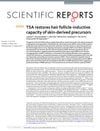 17 citations,
December 2019 in “Stem Cell Research & Therapy”
17 citations,
December 2019 in “Stem Cell Research & Therapy” Grouping certain skin cells together activates a growth pathway that helps create new hair follicles.
June 2019 in “International journal of dermatology and venereology” The Hedgehog Signaling Pathway is important for skin and hair development and skin cancer treatment, but more research is needed to understand it fully.
67 citations,
September 2001 in “American Journal Of Pathology” Inhibiting ODC can prevent UV-induced skin cancer.
 January 2024 in “Revista de la Asociación Colombiana de Dermatología y Cirugía Dermatológica/Revista de la Asociacion Colombiana de Dermatologia y Cirugia Dermatologica”
January 2024 in “Revista de la Asociación Colombiana de Dermatología y Cirugía Dermatológica/Revista de la Asociacion Colombiana de Dermatologia y Cirugia Dermatologica” Baricitinib successfully treated severe hair loss.
 1 citations,
January 2024 in “Curēus”
1 citations,
January 2024 in “Curēus” Upadacitinib significantly improved a man's severe scalp condition when other treatments failed.
 September 2016 in “Journal of dermatological science”
September 2016 in “Journal of dermatological science” Collagen XVII is crucial for skin cell growth and nail health.
April 2019 in “The journal of investigative dermatology/Journal of investigative dermatology” Blocking JAK1 or JAK3 helps reverse hair loss in a mouse model of alopecia areata.
 January 2025 in “International Journal of Dermatology”
January 2025 in “International Journal of Dermatology” Tofacitinib improved hair and nail conditions in a teen with alopecia areata.
 April 2016 in “Journal of Investigative Dermatology”
April 2016 in “Journal of Investigative Dermatology” Decreasing MIG6 can increase the movement and invasiveness of MEK-inhibited mutant NRAS melanoma, particularly when stimulated by EGF.
 47 citations,
November 2012 in “Expert Opinion on Therapeutic Patents”
47 citations,
November 2012 in “Expert Opinion on Therapeutic Patents” The document concludes that research on sulfatase inhibitors should continue due to their potential in treating various diseases, despite some clinical trial failures.
8 citations,
July 2020 in “Dermatologic Therapy” Tofacitinib may effectively treat folliculitis decalvans.
8 citations,
October 2019 in “The Journal of surgical research/Journal of surgical research” Sodium valproate helps skin healing by affecting GABA and histone deacetylase.
 1 citations,
January 2023 in “Przegląd Dermatologiczny”
1 citations,
January 2023 in “Przegląd Dermatologiczny” A man's severe skin reaction from cancer treatment improved with early diagnosis and proper medication.
 January 2022 in “Clinical Cases in Dermatology”
January 2022 in “Clinical Cases in Dermatology” Androgenetic alopecia, a common hair loss condition, can be treated with topical minoxidil, oral finasteride, or oral spironolactone, and new treatments like platelet-rich plasma, low-level laser therapy, and janus-kinase inhibitors are being explored.
 2 citations,
November 2017 in “Elsevier eBooks”
2 citations,
November 2017 in “Elsevier eBooks” Different substances that activate or block the androgen receptor can affect male development and treat conditions like prostate cancer.
3 citations,
August 2021 in “Nutrition research” Estrogen affects how vitamin A is processed in mouse skin, which may impact acne treatment, hair growth, and skin defense.
 June 2023 in “Journal of Clinical Oncology”
June 2023 in “Journal of Clinical Oncology” CDK4/6 inhibitors may cause hair loss in breast cancer patients.
 18 citations,
February 2019 in “Scientific Reports”
18 citations,
February 2019 in “Scientific Reports” Trichostatin A helps restore hair-growing ability in skin cells used for hair regeneration.
 2 citations,
July 2023 in “Journal of cosmetic dermatology”
2 citations,
July 2023 in “Journal of cosmetic dermatology” JAK inhibitors are more effective and safer for treating alopecia areata than dupilumab and apremilast.
 38 citations,
June 2015 in “Expert Opinion on Therapeutic Targets”
38 citations,
June 2015 in “Expert Opinion on Therapeutic Targets” Blocking the prolactin receptor might help treat various diseases, but more research is needed.
 May 2023 in “The journal of investigative dermatology/Journal of investigative dermatology”
May 2023 in “The journal of investigative dermatology/Journal of investigative dermatology” A potential treatment for atopic dermatitis could be to increase PADI1 expression to improve skin barrier function.
 May 2023 in “Journal of managed care & specialty pharmacy”
May 2023 in “Journal of managed care & specialty pharmacy” Alopecia areata causes hair loss and life quality issues; current treatments are often unsatisfactory, but new drugs like JAK inhibitors show promise.
 June 2024 in “International Journal of Dermatology”
June 2024 in “International Journal of Dermatology” Upadacitinib may effectively treat resistant lichen planopilaris.
 September 2022 in “XXXIX Congresso Brasileiro de Reumatologia”
September 2022 in “XXXIX Congresso Brasileiro de Reumatologia” Tofacitinib may effectively treat skin symptoms in difficult cases of dermatomyositis.
 April 2019 in “The journal of investigative dermatology/Journal of investigative dermatology”
April 2019 in “The journal of investigative dermatology/Journal of investigative dermatology” HDAC inhibitors, like Vorinostat and Entinostat, can help regrow hair in alopecia areata.
 63 citations,
May 2011 in “Clinical cancer research”
63 citations,
May 2011 in “Clinical cancer research” The topical inhibitor CUR61414 was not effective in treating basal cell carcinoma in human trials.
 11 citations,
February 2016 in “Current Medicinal Chemistry”
11 citations,
February 2016 in “Current Medicinal Chemistry” New treatments for prostate cancer and BPH show promise, including novel compounds that target hormone synthesis and response.
 April 2023 in “Journal of Investigative Dermatology”
April 2023 in “Journal of Investigative Dermatology” The study created special nanoparticles that effectively deliver an anti-inflammatory drug to treat skin inflammation in psoriasis.
 138 citations,
February 2007 in “European journal of cancer”
138 citations,
February 2007 in “European journal of cancer” EGFR inhibitors often cause skin problems and other side effects, but these are usually reversible and can be managed to keep patients comfortable.
April 2017 in “The Journal of urology/The journal of urology” Long-term use of certain prostate drugs can worsen erectile dysfunction by changing penile tissue, especially in rats with high blood pressure.






















